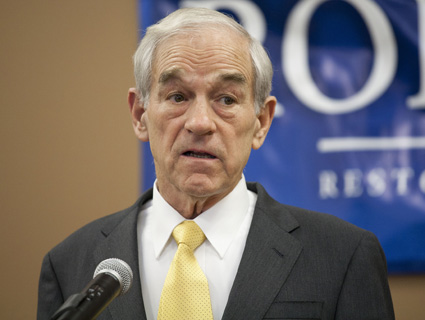
Look no further than Shirley Sherrod or Stanley McChrystal to understand why many politicians exclude reporters and news cameras from all but the most choreographed campaign events. But the practice hasn’t typically applied to their rank-and-file supporters, unpaid volunteers such as leafletters, block-walkers, and MeetUp group members. At least, not until this year. Unusually tight restrictions on media access imposed by candidates such as Rand Paul of Kentucky and Sharron Angle of Nevada, both tea party Senate hopefuls, are being adopted by their supporters at all levels—even folks outside the official party structure who hand out homemade campaign signs at street fairs and gun shows.
“I think everybody is very worried of being painted in a poor light,” Ginny Saville, the organizer of the Lexington Rand/Ron Paul Campaign for Liberty MeetUp group, told me last month. “And that worry isn’t just for Rand’s campaign; that worry extends all the way down to us. We don’t want the entire Liberty effort to be painted as a bunch of gun-totin’, bible-bangin’, anti-semitic racists—all the things that are pinned on us a lot. And it has been happening really bad lately.”
Saville’s was the only tea-party-related MeetUp group out of the 13 that I contacted in Kentucky and Nevada that agreed to speak with me over the phone. The others didn’t respond or referred me to people who never called back. Even Saville drew the line at a phone chat. “When people see your name and what you have written, I don’t think they’re gonna be real interested in you tagging along” for campaign activities, she said. “I think everybody is very, very gun-shy of the media right now.”
Saville and many other Paul campaigners cut their political teeth working for the 2008 presidential campaign of Paul’s father, GOP congressman Ron Paul, whose grassroots machine went to equal but opposite extremes with the press. Believing that Ron Paul and his small-government agenda were being ignored by the mainstream media, his backers blasted off countless press releases and eagerly spoke to me and the few other reporters who gave them ink. They also bypassed the mainstream media altogether by creating a network of independent websites, MoveOn groups, and YouTube channels that became the envy of Washington—and laid much of the groundwork for the tea party protests of 2010.
As the Paulites and other tea party activists rose to prominence this year, however, they discovered that media attention isn’t all its cracked up to be. In May, Rand Paul’s disastrous appearance on the Rachael Maddow Show prompted members of his own party to distance themselves from his position on the Civil Rights Act. Sharron Angle’s statements to the conservative media when she was an obscure primary candidate—she opposed abortion even in cases of rape and said it wasn’t the Senate’s role to create jobs—now factor into political ads being run by her opponent, Senate Majority Leader Harry Reid. And Mark Williams, the chairman of the Tea Party Express, was booted from the Tea Party Federation a week ago after he told National Public Radio that “NAACP leaders make more money off race than any slave trader ever.”
These kinds of early missteps have seemed to convince tea party candidates to follow the example of another erstwhile media blunderer, vice-presidential candidate Sarah Palin, whose disastrous interview with Katie Couric was one of the last times she spoke in depth with a trenchant reporter. Likewise, Paul and Angle no longer grant interviews to most national media. Angle has been so tight-lipped around the press that her opponents created a website that pictures her holed up in an underground bunker. California gubernatorial candidate Meg Whitman, the former CEO of eBay, also avoids the media despite her more moderate political views.
To be sure, my difficulty in reaching Paul and Angle (both of whom didn’t return calls) and their grassroots supporters could stem from Mother Jones‘ progressive image. Yet that doesn’t fully explain it. Last week, John Brummett, a columnist for the right-of-center Las Vegas Review-Journal, complained that “Republicans seem to want to insulate [Angle] from the objective media.” (Here’s a video of her literally fleeing from reporters after refusing to take questions at a press conference). And Jack Brammer, a political reporter for the Lexington Herald-Leader in Kentucky, told me that Paul’s grassroots supporters have been “slightly more” reluctant to speak to him than those of his opponent, state attorney general Jack Conway.
Tea partiers may feel, somewhat justifiably, that campaigning no longer requires the mainstream media. The same online political apparatus that courted the press during Ron Paul’s presidential bid now allows Rand to ignore it in favor of speaking directly to potential supporters. Libertarian websites and right-wing news outlets drive an unusually copious stream of out-of-state money to Paul and Angle’s political coffers. And MeetUp groups created during the Ron Paul campaign now provide Rand with a ready-made campaign army that can take his message door to door. Scott Lasley, a political science professor at Western Kentucky University, told me that “the unique strength of Rand Paul, which I think extends also from his dad, is the ability to tap into this core of activists who will show up and run through a wall for him.”
Of course, not every right-wing candidate commands the Paulites’ political muscle. And given that not all voters watch Fox News, many could come to view tea party candidates as unresponsive. Yet that’s a risk that the tea partiers are willing to take. “At least when we go out and talk to people, we get to have full conversations with people,” Saville says. “That’s totally different in talking to a reporter who is going to interpret what you say in whatever way they will. You have no chance for rebuttal or no chance to explain. You guys need to do a better job if you want people to talk to ya.”















